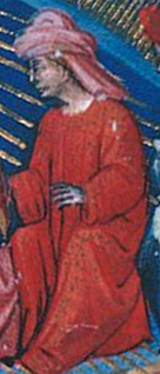Kimel’s review of What is the Trinity – Part 1
Synopsis: I’m not Eastern Orthodox, so am incompetent to discuss the Trinity, and I’m somehow missing the whole point.
Synopsis: I’m not Eastern Orthodox, so am incompetent to discuss the Trinity, and I’m somehow missing the whole point.
In this series of posts, I’ve been discussing the view of Arius that the Son is created from nothing, and the view of Athanasius that the Father begets the Son. All of this illustrates two basic issues that any classical account of the Trinity has to face when it tries to explain how one divine person produces another. First, we need to think carefully before… Read More »Arius and Athanasius, part 11 – General questions about divine production (JT)
“But I say to you that if you are angry with a brother or sister, you will be liable to judgment; and if you insult a brother or sister, you will be liable to the council; and if you say, ‘You fool,’ you will be liable to the hell of fire.”
It has occurred to me that many readers, especially new readers, may misread my ongoing discussion of modalism and modalists. As I use the term “modalism”, it is a descriptive term for how some people think about one or more of the Father, Son, and Holy Spirit. Most people, though, use it as a tag for a certain heretical theology, long denounced by mainstream Christianity.… Read More »modalism and “modalism”

In three of the last four posts (Rick St. Vick 6, 7, 9, 10) I surveyed some of Richard of St. Victor’s arguments for why there must be at least three divine persons. (We’ve yet to see an argument for there aren’t more than three persons.) Here I’d like to respond to these, and to one JT’s responses too.Read More »Richard of St. Victor 11 – Response to the Argument From Love Thus Far (Scott)
What sort of thing is time, anyway? Philosophers disagree…
Theologian-apologist-philosopher Dr. James N. Anderson of Reformed Theological Seminary has posted his new entry for IVP’s New Dictionary of Theology on “Paradox” – that is, on apparent contradictions. Saith Dr. Anderson, Various approaches to theological paradoxes have been proposed, including: (1) The paradoxes involve real contradictions, but God is not bound by ‘human logic’. (2) The paradoxes involve real contradictions, and therefore some traditional doctrines need to be… Read More »Dr. James N. Anderson on Paradoxes in Theology
The debate question is: Jesus is human and not divine.
Many who are often spun as “proto-trinitarian” thought the one true God is the Father alone.
Was Arius the ultimate Judas? Was he an arrogant innovator, a devotee of Greek philosophy, a Judaizer, a hater of mysteries, a phony, a snake in the grass? In this episode, we look at Arius and his theology, in (as much as is now possible) in his own words. You can also listen to this episode on youtube. You can also listen to this episode… Read More »podcast 29 – Arius
A helpful two-on-two debate from April 2023: opening statements and rebuttals.

We now turn to Richard’s De Trinitate Book 3, Chapters 14-19
Here’s my formulation of the first part of ch.14:
Suppose there’s at least one divine person: P.
Then (1) P is so benevolent that he wants to have no good that he does not want to share.
And (2) P is so powerful that everything is possible for him.
And (3) P is so happy that nothing is difficult for him.
And (4) if (1)-(3) are true, there are at least three divine persons.
Therefore, (C) If there is at least one divine person, then there are at least three divine persons.Read More »Richard of St. Victor’s De Trinitate Ch.14
John Edwards (1637-1726) was an Anglican Calvinist and would-be defender of Christian orthodoxy. Seemingly at the last minute, he tacked on to his Some Thoughts Concerning the Several Causes and Occasions of Atheism (1695) a critique of Locke’s Reasonableness. Guns blazing, he charged Locke (among other things) with promoting “Socinianism” (aka “Racovian” theology, i.e. the type of unitarian theology famously expounded by the Polish Brethren,… Read More »podcast 54 – John Edwards vs. John Locke’s Reasonableness of Christianity

“Will the real H.o.G. please stand up?”
Henry of Ghent was an eclectic theologian. He fancied new theories and adored old theories. When it comes to the doctrine of the Trinity, Henry was a glutton for old and new doctrines. What was old that he liked? His favourite theologian was Augustine, and his favourite book titled De Trinitate was Augustine’s. Of course, Henry didn’t just read Augustine, he read other De Trinitate texts: Boethius, Ambrose, Hilary, Richard of St. Victor and learned important lessons from these. The primary theological source for psychological doctrines applied to the Trinity comes from Augustine (who contemplated such models as the Father as Memory, Son as Intelligence/Word, and Holy Spirit as Will/Love). Further, Henry takes Richard of St.Victor’s claim about the importance of ‘mutual love’ (of the Father and Son) and applies it as the principiative principle for the production of the Holy Spirit. A ‘principiative principle’ is a fancy phrase for ‘productive power’. Henry seems to use it at times in distinction from a productive power for the production of created essences (e.g. human beings). Still, the the semantic range of this can be applied to ad intra divine productions, and ad extra creaturely productions.
Henry also fancied ‘new’ doctrines of human philosophical psychology, though he was critical of these. What he liked was Aquinas’s developed teaching about what a mental ‘Word’ is, namely, a product that an intellect can produce that is really distinct from the intellect and its operations. This ‘word’ inheres in the intellect as an accident. Further, Henry liked the notion that this product is some sort of ‘final’ act of the intellect. Of course, in the divine case the ‘Word’ won’t ‘inhere’ in the divine essence, but ‘subsist’ in its. This of course is ambiguous (and worthy of another post).Read More »H.o.G.: Philosophical Psychology at Play with the Father and Word/Son (Scott)
 Every philosophy student and every theology student should know about the original Sokal hoax. Here’s the best reflection on its important lessons. (Dr. Boghossian later expanded the discussion in this book.)
Every philosophy student and every theology student should know about the original Sokal hoax. Here’s the best reflection on its important lessons. (Dr. Boghossian later expanded the discussion in this book.)
Now a philosopher has pulled a similar hoax; this time it’s a naturalistic atheist vs. the Association for Reformational Philosophy. The story is at Jerry Coyne’s blog, Why Evolution is True. (Never mind that this particular post provides no such reason. 🙂 ) Coyne notes,
This shows once again the appeal of religious gibberish to the educated believer
True – for some. But Read More »Linkage: Sokal Hoax 2.0
Why he dismissed biblical unitarian theology and why he decided to give it another look.
Should everyone know these truths?
In this episode I get post-debate reflections from the (biblical) unitarian Christian debater, Steve Katsaras. He’s the founding pastor of the Red Words Church in Melbourne, Australia . His sermons are regularly podcasted here. If he sounds a little sleepy, that’s my fault; I asked him to talk to me on the same night as the debate, and he graciously agreed. We discuss highlights of… Read More »podcast 9 – post-debate interview with Pastor Steve Katsaras
In 2007 I read Triads and Trinity, by the late Classicist and Egyptologist John Gwyn Griffiths, a book which tries to trace outside influences on the development of the Christian doctrine of the Trinity. I was skeptical about any such project, as I knew it has long been a staple of crackpot antitrinitarians to allege that the Trinity doctrine was illegally imported from (take your pick) Babylon,… Read More »Triads and Trinity: a mini-review
In this interesting presentation called “Yet Another Music City Miracle” pastor J. Dan Gill points out that the way evangelicals evangelize is incompatible with the old catholic tradition, famously asserted in the “Athanasian” creed, Whosoever will be saved, before all things it is necessary that he hold the catholic faith; Which faith except every one do keep whole and undefiled, without doubt he shall perish… Read More »J. Dan Gill: Must one believe in the Trinity and the two natures of Jesus to be saved?